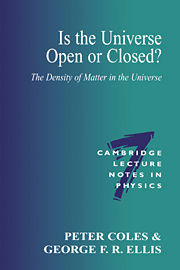5 - Astrophysical arguments
Published online by Cambridge University Press: 25 January 2010
Summary
In this chapter we shall discuss the dark matter inferred from astrophysical measurements. We divide these astrophysical arguments into three broad categories: galaxies, rich clusters of galaxies and the intergalactic medium. Because astrophysical processes (with the exception of gravitational effects) generally involve baryonic material only, the constraints we discuss frequently, though not exclusively, relate only to the baryonic contribution to the total density. We shall discuss constraints from large-scale structure in the matter distribution (i.e. clustering on scales greater than the scale of individual rich clusters) in the next chapter. For an extensive and influential survey of much of the astrophysical evidence see Peebles (1971), which serves as a standard reference for much that we discuss in this chapter; see also Faber & Gallagher (1979).
Galaxies
It was suggested as early as the 1930s that the total amount of matter in our own galaxy, the Milky Way, is greater than can be accounted for by the visible matter within it (e.g. Oort 1932). We shall not, however, go into any detail here concerning the evidence from stellar dynamics that there is dark matter in the disk of the Milky Way; see, for example, Bahcall (1984). This is still an open question. What we are interested in is the evidence for massive haloes of dark matter surrounding our own and other galaxies.
The mass-to-light ratio
Before discussing the evidence for dark matter in galaxies and clusters, we need to introduce some notation.
- Type
- Chapter
- Information
- Is the Universe Open or Closed?The Density of Matter in the Universe, pp. 89 - 110Publisher: Cambridge University PressPrint publication year: 1997



